Just In
- 33 min ago

- 2 hrs ago

- 3 hrs ago

- 3 hrs ago

Don't Miss
- Travel
 Mumbai Opens BMC Headquarters For Exclusive Heritage Tour
Mumbai Opens BMC Headquarters For Exclusive Heritage Tour - News
 Electoral Bonds Plea In SC Seeks SIT Probe Into Alleged Quid Pro Quo Between Parties Corporates
Electoral Bonds Plea In SC Seeks SIT Probe Into Alleged Quid Pro Quo Between Parties Corporates - Sports
 WWE NXT Spring Breakin’ 2024: Title Matches and more announced for Night Two
WWE NXT Spring Breakin’ 2024: Title Matches and more announced for Night Two - Automobiles
 The Rise and Fall of the TVS Jive: India's Pioneering Clutchless Motorcycle
The Rise and Fall of the TVS Jive: India's Pioneering Clutchless Motorcycle - Education
 TS Inter Results 2024 Toppers' List, Check Out the Districts That Top the List
TS Inter Results 2024 Toppers' List, Check Out the Districts That Top the List - Finance
 PayU Gets RBI's In-principle Nod To Operate As Payment Aggregator
PayU Gets RBI's In-principle Nod To Operate As Payment Aggregator - Movies
 The Family Star OTT Release Date & Platform Revealed: Here's When & Where To Watch Vijay Devarakonda’s Film
The Family Star OTT Release Date & Platform Revealed: Here's When & Where To Watch Vijay Devarakonda’s Film - Technology
 Realme Narzo 70 5G, Narzo 70x 5G Launched in India: Check Price, Specs, Availability
Realme Narzo 70 5G, Narzo 70x 5G Launched in India: Check Price, Specs, Availability
World Breastfeeding Week 2021: Breastfeeding Safely During COVID-19 Pandemic
World Breastfeeding Week (WBW) is observed every year from 1 to 7 August in more than 120 countries. Initiated by the World Alliance for Breastfeeding Action (WABA), World Health Organisation (WHO) and The United Nations Children's Fund (UNICEF) in 1991, the event aims to promote exclusive breastfeeding for the first six months of an infant's life, which yields many health benefits.
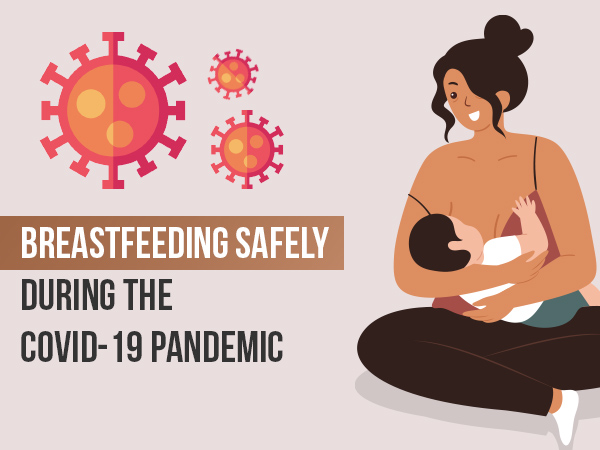
Breastfeeding for the first six months helps in providing critical nutrients, protection from deadly diseases such as pneumonia and fostering the growth and development of the child [1]. World Breastfeeding Week was first celebrated in 1992 by the World Alliance for Breastfeeding Action (WABA).
The theme of World Breastfeeding Week 2021 is 'Protect Breastfeeding: A Shared Responsibility.' It raises the need for governments to protect and promote women's access to skilled breastfeeding counselling, a critical component of breastfeeding support [2].
On this World Breastfeeding Week (WBW), we will bring some important information for mothers, that is, breastfeeding amidst the Covid-19 pandemic.
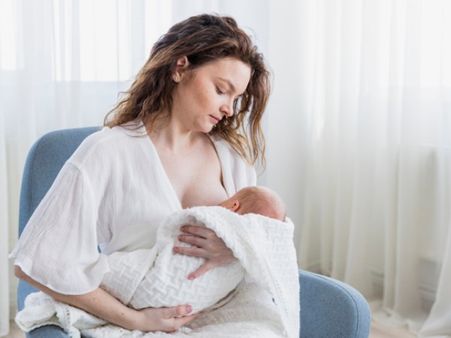
Breastfeeding During COVID-19 Pandemic: Is It Safe?
Breast milk is the primary source of nutrition for babies and protects them against illness. When there is a disruption of breastfeeding, it can lead to a drop in milk supply, refusal by the infant to take the breast and a decrease in protective immune factors contained in breast milk [3].
With the coronavirus pandemic continuing to spread globally, it is only natural for a mother or an expecting mother to be concerned about the safety of their baby. According to reports, evidence suggests that breastfeeding during the pandemic is completely safe [4].
Here are some of the major points from studies and reports that support the assertion that breastfeeding during the COVID-19 pandemic is safe.
- The American Academy of Pediatrics (AAP) pointed out in a study that breast milk is considered to be an unlikely source of transmission of SARS-CoV-2 and breastfeeding as the best choice for infant feeding [5].
- Birthing parents who contracted the novel coronavirus are unlikely to transmit it to their newborn if proper precautions such as hand and breast washing, and wearing a surgical mask while feeding is followed [6].
- Some experts suggest that breastfeeding with COVID-19 can provide the newborn with antibodies that are protective against the coronavirus [7][8].
Health experts stress the importance of breastfeeding your child, as skin-to-skin contact and early, exclusive breastfeeding helps your baby to thrive. And, till now, there have been no reports of transmission of active COVID-19 through breast milk and breastfeeding.
The Covid-19 virus spreads between people who are in close contact, mainly through respiratory droplets when an infected person coughs, sneezes or while talking.
Pregnancy Brain Is Not A Myth! Read On To Know About Momnesia And Ways To Manage It
Therefore, it is safe to say that the infectious SARS-CoV-2 can pass from mother to baby through breast milk. The finding which states that breastfeeding is safe even when a mom has viral illnesses like influenza acts as a supportive argument here.
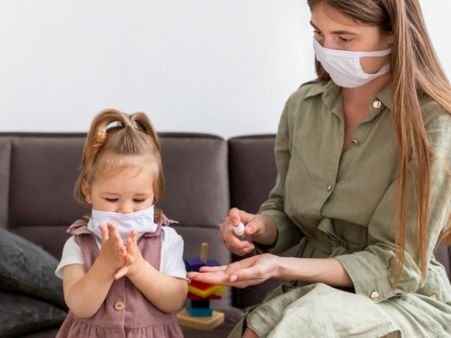
Should I Breastfeed During The COVID-19 Pandemic?
Yes. Breastfeeding helps provide antibodies that are beneficial for the overall health of the baby and also protect them against many infections [9]. If your baby is six months old or younger, he or she should be breastfed exclusively. After six months, continue breastfeeding with healthy complementary foods [10].
Should I breastfeed if I have or suspect I have COVID-19?
According to experts, yes. You may continue breastfeeding with appropriate precautions such as the following [11]:
- Wear a mask.
- Wash your hands with soap and water or with an alcohol-based hand rub before and after touching your baby.
- Routinely clean and disinfect surfaces you have touched.
- You need to wash your chest only if you have just coughed on it (your breast does not need to be washed before every feeding).
- Wear a mask during feeding,
- Wash hands with soap before and after touching the baby and,
- Wipe and disinfect surfaces regularly.
- you have been fever-free for 24 hours without taking any fever medicines,
- at least ten days have passed since your COVID-19 symptoms first started and
- all your symptoms have improved.
UNICEF points out the importance of following the 3 Ws, which are:

If I have COVID-19, can I stay in the same room with my infant?
Wear a cloth face covering and wash your hands whenever you directly care for your baby and make sure that you keep a reasonable distance when possible [12]. Continue taking these precautions until:
Note: If you tested positive but have no symptoms, wait until at least ten days after the positive test result.
How can I maintain my milk supply if I am sick with COVID-19?
Hand pumping and hand expressing breast milk are helpful in the first few days after your baby is born. As experts suggest, frequent pumping or breastfeeding (if you are following the strict precautions) for about 8-10 times in 24 hours can help maintain the flow [13].
Note: Expressing milk means squeezing milk out of your breast so you can store it and feed it to your baby later.

Can my baby continue breastfeeding or drink expressed breast milk if I test positive for COVID-19?
Yes, your baby can still receive breast milk even if you test positive for Covid-19.
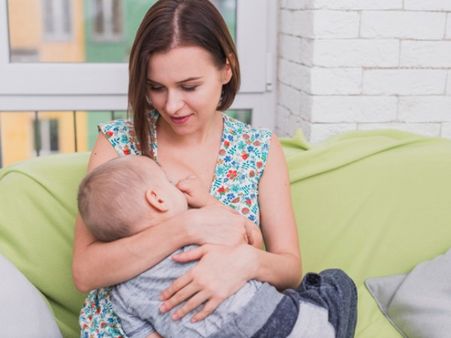
WHO Breastfeeding Advice During The COVID-19 Outbreak
The World Health Organization has issued a list of precautions and guidelines for breastfeeding mothers and health facilities to follow, and they are as follows [14]:
- If you are severely ill with Covid-19 or suffer from other complications that prevent you from caring for your infant or continuing direct breastfeeding, express milk to provide breast milk to your infant safely.
- Suppose you are too unwell to breastfeed or express breastmilk, you should explore the possibility of re-lactation (restarting breastfeeding after a gap), wet nursing (another woman breastfeeding or caring for your child), or using human donor milk.
- If you, your infants, or young children have suspected or confirmed Covid-19, seek breastfeeding counselling, necessary psychosocial support or practical feeding support.
Health facilities that provide support for breastfeeding mothers should enable mothers and infants to remain together and practice skin-to-skin contact and stay together throughout the day and night. Especially straight after birth during the establishment of breastfeeding, whether or not the mother or child has suspected, probable, or confirmed COVID-19.
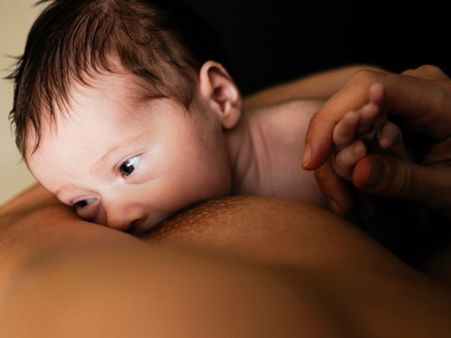
On A Final Note…
The novel coronavirus has not been found in breast milk, and all mothers are advised to continue breastfeeding while practising good hygiene during feeding. Take additional hygiene measures and continue to breastfeed if you fall sick. Wash breast milk pumps, milk storage containers and feeding utensils after every use as usual.
-
 pregnancy parentingExpert Opinion On Breastfeeding: How It Will Help Baby And Mother
pregnancy parentingExpert Opinion On Breastfeeding: How It Will Help Baby And Mother -
 pregnancy parentingShattering Myths: Breastfeeding Success After Surviving Breast Cancer
pregnancy parentingShattering Myths: Breastfeeding Success After Surviving Breast Cancer -
 pregnancy parentingWeight Loss: Can I Diet While Breastfeeding? How Much Weight Can I Lose?
pregnancy parentingWeight Loss: Can I Diet While Breastfeeding? How Much Weight Can I Lose? -
 pregnancy parentingBreastfeeding Pain: What To Do When It Hurts
pregnancy parentingBreastfeeding Pain: What To Do When It Hurts -
 pregnancy parentingWhat To Do If You Get Dengue When Breastfeeding
pregnancy parentingWhat To Do If You Get Dengue When Breastfeeding -
 pregnancy parentingWorld Breastfeeding Week 2023: Can You Breastfeed If You Have Hyperthyroidism?
pregnancy parentingWorld Breastfeeding Week 2023: Can You Breastfeed If You Have Hyperthyroidism? -
 pregnancy parentingWorld Breastfeeding Week 2023: Expert Tips For Breastfeeding In Public; Is It Legal In India?
pregnancy parentingWorld Breastfeeding Week 2023: Expert Tips For Breastfeeding In Public; Is It Legal In India? -
 pregnancy parentingWorld Breastfeeding Week 2023: When Breastfeeding Might Not Be The Right Choice: Who Shouldn't Breastfeed?
pregnancy parentingWorld Breastfeeding Week 2023: When Breastfeeding Might Not Be The Right Choice: Who Shouldn't Breastfeed? -
 healthBreastfeeding And Periods: Is It Okay To Breastfeed Your Baby During Menstruation?
healthBreastfeeding And Periods: Is It Okay To Breastfeed Your Baby During Menstruation? -
 pregnancy parentingWorld Breastfeeding Week 2023: What Do You Do If Your Baby Doesn’t Like Breastfeeding?
pregnancy parentingWorld Breastfeeding Week 2023: What Do You Do If Your Baby Doesn’t Like Breastfeeding? -
 pregnancy parentingWorld Breastfeeding Week 2023: Do Babies Choke On Breast Milk? Find Out Here!
pregnancy parentingWorld Breastfeeding Week 2023: Do Babies Choke On Breast Milk? Find Out Here! -
 pregnancy parentingWorld Breastfeeding Week 2023: Breastfeeding Made Easy; Expert Advice For New Mothers
pregnancy parentingWorld Breastfeeding Week 2023: Breastfeeding Made Easy; Expert Advice For New Mothers


 Click it and Unblock the Notifications
Click it and Unblock the Notifications




